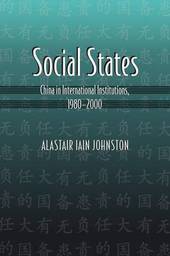
|
Social States: China in International Institutions, 1980-2000
Paperback / softback
Main Details
| Title |
Social States: China in International Institutions, 1980-2000
|
| Authors and Contributors |
By (author) Alastair Iain Johnston
|
| Series | Princeton Studies in International History and Politics |
|---|
| Physical Properties |
| Format:Paperback / softback | | Pages:280 | | Dimensions(mm): Height 235,Width 152 |
|
| ISBN/Barcode |
9780691134536
|
| Classifications | Dewey:327.51 |
|---|
| Audience | | Professional & Vocational | | Tertiary Education (US: College) | |
|---|
| Illustrations |
26 line illus. 6 tables.
|
|
Publishing Details |
| Publisher |
Princeton University Press
|
| Imprint |
Princeton University Press
|
| Publication Date |
23 December 2007 |
| Publication Country |
United States
|
Description
"Constructive engagement" became a catchphrase under the Clinton administration for America's reinvigorated efforts to pull China firmly into the international community as a responsible player, one that abides by widely accepted norms. Skeptics questioned the effectiveness of this policy and those that followed. But how is such socialization supposed to work in the first place? This has never been all that clear, whether practiced by the Association of South East Asian Nations (ASEAN), Japan, or the United States. Social States is the first book to systematically test the effects of socialization in international relations-to help explain why players on the world stage may be moved to cooperate when doing so is not in their material power interests. Alastair Iain Johnston carries out his groundbreaking theoretical task through a richly detailed look at China's participation in international security institutions during two crucial decades of the "rise of China," from 1980 to 2000.Drawing on sociology and social psychology, this book examines three microprocesses of socialization--mimicking, social influence, and persuasion--as they have played out in the attitudes of Chinese diplomats active in the Conference on Disarmament, the Comprehensive Nuclear Test Ban, the Convention on Conventional Weapons, and the ASEAN Regional Forum. Among the key conclusions: Chinese officials in the post-Mao era adopted more cooperative and more self-constraining commitments to arms control and disarmament treaties, thanks to their increasing social interactions in international security institutions.
Author Biography
Alastair Iain Johnston is the Governor James Noe and Linda Noe Laine Professor of China in World Affairs at Harvard University.
Reviews"What is the process by which norms in the international system change the behavior of states? Johnston wants to identify the working parts of the causal mechanism. But rather than emphasizing pressure from other states or changing strategic interests to explain decisions to join security regimes, Johnston focuses on the social learning that takes place when policymakers interact with representatives of other states."--Andrew J. Nathan, Foreign Affairs "Johnston offers his arguments in a very cautious way, with meticulous care given to theory and methodology, thereby setting a standard that is rarely found in the current body of literature on the subject... Johnston has certainly published an excellent book, that shows how cutting-edge research can be conducted by exploring in great depth an inter-disciplinary area to help shed new light on Chinese foreign policy. The book's narrow focus on security institutions makes it well-defined; we may hope that Johnston will find it worthwhile to go beyond this in future work."--Gerald Chan, The China Journal
|